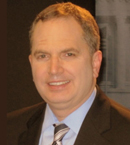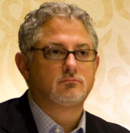A statement was released to business and media reporters at print and broadcast outlets throughout the U.S. on Oct. 19 via PR Newswire by Mark Hamrick, president of the Press Club.
 Hamrick |
The statement said the NPC attempted to convince PRSA to admit O’Dwyer staffers to the Assembly but “PRSA was unwilling to do this.”
PRSA elected officers and staff that NPC reached out to included chair Rosanna Fiske; chair-elect Mickey Nall; president and COO Bill Murray, and VP-PR Arthur Yann.
Yann put a statement on the Society’s website saying the organization would continue to block O’Dwyer staffers because it “cannot tolerate and accept unethical behavior on the part of a representative of the media.” It added that Jack O’Dwyer during three days at the recent conference “initiated a number of unwanted, unwarranted and uncomfortable interactions with conference attendees, presenters and exhibitors.”|
The full Society statement is at the end of this blog.
A current question of ours to the Society is how ethical is withholding IRS Form 990 from the Assembly for the third year in a row? Yann has given no indication of when it will be released except to say the law is that the Society has until Nov. 15 to provide it.
Hamrick noted that Jack O’Dwyer has covered the Assembly for more than 40 years and should be admitted to the 2011 session as long as he did not behave in a “disruptive way.”
 Hamrick and NPC executive director Bill McCarren had been sent the 23 pages of charges against the O’Dwyer Co. and its staffers and both examined them.
Hamrick and NPC executive director Bill McCarren had been sent the 23 pages of charges against the O’Dwyer Co. and its staffers and both examined them.Said the statement: “While we find many of the points in the letter unfortunate and even highly disagreeable we do not think they constitute a reason to ban a reporter who has been allowed access for 40 years.
“PR professionals might have some ethical issues with individual reporters and no doubt journalist must cover and report on the activities of PR people they find to be unethical.”
Hamrick said that in general reporters should be allowed at events as long as they do not disrupt the events.
“Asking difficult questions designed to get answers that an organization would rather not provide is not disrupting the event. We would rather see a group like PRSA allow reporters who might write negate stories about them into their events than not. We think it sets a good example for their members whereas banning reporters does not.
He added: “We live in a world where journalist access is too often and too easily denied. We hope PRSA will reconsider its approach and decide next year to hold a convention that does not ban any reporters who wish to cover their activities.”
The PRS letter, signed by Fiske and Murray, and which barred all O’Dwyer employees or any “assign,” accused this reporter of not being an “ethical” reporter.
Yann also charged PR Watch with behavior that “falls well outside the ethical standards espoused by the Society of Professional Journalists” and said Bob Conrad of thegoodthebadthespin.com should examine his own values “as they apply to blog etiquette, civil discourse and journalistic accuracy, balance and ethics.”
Conrad had criticized Fiske for declaring that a member survey showed that members were “incredibly satisfied” with the Society. He said the return rate was only about 5% of the 21,000 members who were sent e-mails and that was far to small for any conclusions to be drawn.
 Yann |
NPC, founded in 1908, has 3,400 members including journalists and communications professionals. Its Speakers Luncheon Series is regularly televised live on C-SPAN and aired on other broadcast outlets. More than 250,000 attend its 2,000+ events yearly.
It is D.C.’s most frequently used site for news conferences. Its activities include education for journalists and providing scholarships for journalists. It operates the nation’s only non-academic research library for journalists.
The NPC is “committed to the promotion of free press worldwide,” says its press releases.
The full NPC release is below:
National Press Club Disappointed to Learn PRSA Banned Reporter From Meeting
To: Business Desk, Media Writer
Contact: Bill McCarren, 202-662-7534 for the National Press Club
WASHINGTON, Oct. 19 – The following statement was released today by Mark Hamrick, President of the National Press Club.
The National Press Club was disappointed to learn that the Public Relations Society of America (PRSA) banned veteran reporter Jack O’Dwyer from covering the PRSA General Assembly last weekend in Orlando. We understand that Mr. O’Dwyer has covered the event for more than 40 years. We also understand that Mr. O’Dwyer and the PRSA have had a long running series of disagreements that have tested and continue to test their relationship. The nature and content of these disagreements is of great concern to both PRSA and Mr. O’Dwyer.
What we find concerning is the solution chosen by the PRSA, which was to ban a reporter who will write stories that may be critical of their organization. We asked PRSA to reconsider its position and to allow Mr. O’Dwyer in. We suggested that if he behaved in a disruptive way he should be removed. PRSA was unwilling to do this.
They have prepared a 23-page letter that says Mr. O’Dwyer is not an ethical reporter. Mr. O’Dwyer sent us the letter himself (twice) for our review as did the PRSA. While we find many of the points in the letter unfortunate and even highly disagreeable we do not think they constitute a reason to ban a reporter who has been allowed access for 40 years. Public relations professionals might have some ethical issues with individual reporters and no doubt journalists must cover and report on the activities of public relations people they find to be unethical. And we are sure this discussion will still be going on years from now as it was years ago.
On the issue of access for reporters, however, we are generally in favor of it as long as the reporters do not disrupt events. Asking difficult questions designed to get answers that an organization would rather not provide is not disrupting an event. We would rather see a group like PRSA allow reporters who might write negative stories about them into their events than not. We think it sets a good example for their members whereas banning reporters does not.
We live in a world where journalist access is too often and too easily denied. We hope PRSA will reconsider their approach and decide next year to hold a convention that does not ban any reporters who wish to cover their activities.
PRSA's statement on the Press Club support follows:
October 19, 2011
Statement: PRSA's Decision to Deny Media Credentials for Industry Publisher Jack O'Dwyer
The Public Relations Society of America (PRSA) today issued the following statement in response to concerns raised by the National Press Club regarding PRSA's decision to deny media credentials to its Leadership Assembly and International Conference to industry publisher Jack O'Dwyer:
On Oct. 14, I had a very cordial and extended conversation with Bill McCarren, executive director of the National Press Club. I appreciated his courtesy in reaching out to the Public Relations Society of America (PRSA) to better understand the circumstances under which PRSA denied industry publisher Jack O’Dwyer media credentials to attend PRSA’s Leadership Assembly meeting and International Conference, which took place Oct. 15-18, in Orlando, Fla.
PRSA has excellent relationships with the national and international media, many of whom attended our events this week. As I explained to Mr. McCarren, the PRSA Code of Ethics, which all members of PRSA are required to follow as a condition of membership, promotes the “free flow of accurate and truthful information.” As such, our policy is to give any member of the media access to our leaders, volunteers and events.
However, as we espouse and require ethical behavior on the part of our members, we cannot tolerate and accept unethical behavior on the part of a representative of the media. Furthermore, we cannot allow a journalist to disrupt our meetings or degrade the experiences of the PRSA members and other professionals who attend our events. Even without having been given press credentials, Mr. O’Dwyer was a guest at our conference hotel for more than three days, during which time he initiated a number of unwanted, unwarranted and uncomfortable interactions with Conference attendees, presenters and exhibitors.
We have provided Mr. O'Dwyer with a 23-page document that outlines our concerns with his professional conduct. His conduct also prompted the Society of Professional Journalists (SPJ) to invite Mr. O’Dwyer to resign his membership in that organization. And in its own statement, the National Press Club could not help but concede that many of Mr. O'Dwyer's actions are "unfortunate" and "even highly disagreeable." It strikes us as ironic that the National Press Club would question PRSA's actions, while at the same time excusing Mr. O'Dwyer's.
[O'Dwyer interjects: The SPJ refused to explore the many facts surrounding the ban on me, saying I have been singing the same tune 20 years and SPJ does not want to get into the middle of this "battle." Executive Director Joe Skeel said that if I don't like the SPJ's stance on this I can quit and get my money back. Neither he nor SPJ is accusing me of any unethical conduct]. I think SPJ should take action on this and not sit on the sidelines].
We encourage Mr. O’Dwyer to make this document public, so that the casual observer can better understand the context in which our decision was made, and appreciate the reasons why we have taken this unprecedented step.
Arthur Yann, Vice President, Public Relations

